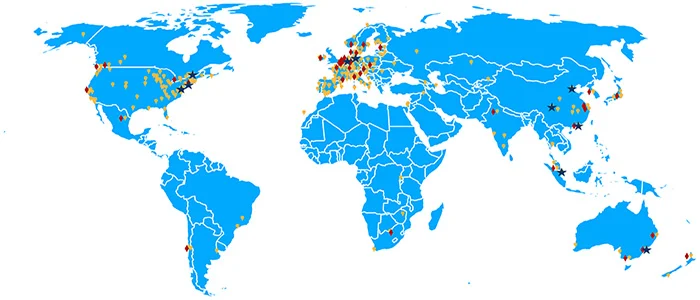This is one of the many important questions students ask as they search for schools in countries far away from what they have known as ‘home’. For many students, going abroad to study can be daunting (and exciting at the same time!). That is why we have tipped down lists of work-study countries for international students 2020/2021.It’s important to make sure you’re fully prepared before arriving in a country so that you know exactly what’s ahead of you and can avoid any unexpected stress. Part of being fully-prepared as an international student is planning and deciding on a part-time job while schooling.
Studying and working in UK
The UK is quite selective about allowing international students to work. Students from outside the UK/an EU country, usually need a visa to study in the UK and a list of other requirements. As such, students that are planning to study in the United Kingdom must know that the country only allows international students work only if they are granted a Tier 4 Visa. This visa is given to international students who are studying in the UK for at least six months. International students will be allowed to work in most jobs depending on their course level and the kind of sponsor they have. A tier-4 visa usually permits international students to work on an average of 20 hours per week during school sessions and full-time during the holidays.
Studying and working in the USA
The United States issues two kinds of visas to all students coming into the country. The F-1 and the M-1 visas. The F-1 Visa (Academic Student) allows an international student to enter the United States as a full-time student at an accredited college, university, seminary, conservatory, academic high school, elementary school, or other academic institution or in a language training program.Once an international student receives their F-1 visa, they will have the right to work On-Campus for a maximum of 20 hours per week during the study period and up to 40 hours per week during the vacations period. This is because students on an F-1 visa can only work on-campus in their first year of studies.
Australia
International students intending to study in Australia will need to apply for the Student visa (subclass 500). The student visa allows for up to 40 hours of work every two weeks during the study period and full time during the holidays, for students who desire to work and study in Australia. This means that before you undertake any paid work, you need to make sure your visa permits you to work. Also, it is important to know that, once you find a job in Australia, your employer must give you a formal award or agreement which should establish the minimum wage you will receive per hour, as well as your working conditions
Germany
International students from other countries can work a total of 120 full or 240 half days per year and on permission from the “Agentur für Arbeit” (Federal Employment Agency), an international student can put in more hours. Whether a student is issued a work permit largely depends on the condition of the local job market. You are less likely to receive a permit to work more than 120 days in regions with higher unemployment rates. This does not include work as a research assistant. There are no time limits apply for this activity. However, a student may still require permission. In addition, international students from outside the EU or EEA are not permitted to work in a self-employed or freelance capacity.
Canada
Obtaining a Canadian visa can be quite a herculean task. It is not the same for students intending to study in Canada. While it is necessary for international students to supply sufficient evidence that tuition and living expenses will be adequately taken care of, there are a good number of work permit programs for international students that make working in Canada possible. International students who hold valid study permits and who are studying full time at eligible Canadian public and private universities or colleges may be eligible to work on-campus at the institution where they study without a work permit.
The Off-Campus Work Permit authorizes a student to put in up to 20 hours per workweek during regular academic sessions, and full time during holidays and scheduled breaks while the Co-op/Internship Work Permit Program will be given to international students whose intended employment is an essential part of their program of study in Canada as certified by their Canadian academic institution.
France
International students in France are able to work both On-Campus and Off-Campus as in Canada. However, in order for this to happen, the student is expected to have a residency card and be studying in an institution that gives access to the Social Security System. Being a student in France gives the right to work up to 964 hours during the year, which is equivalent to 60% of the 35 hours per week that are usually worked in the country. In France, the minimum wage is 9.40 euros per hour with approximately 20% going to taxes.
Spain
In Spain, international students can ask for a work permit from the local authorities, for work of up to 20 hours per week. Student work permits in Spain allow the student to work in a company with which he/she has signed a part-time work contract. This permit will have the same length as one of the contracts, and cannot be higher than the duration of the student visa.
Malaysia
International students are also allowed to work part-time for a maximum of 20 hours per week during semester breaks or holidays of more than 7 days while studying full-time in Malaysia, subject to immigration requirementsI .
Singapore
With the increase in the outpour of international students, Singapore’s rules about international students working part-time have become very stringent. Only students studying in those Universities and Polytechnics listed by the government of Singapore are allowed to work for 16 hours a week.







